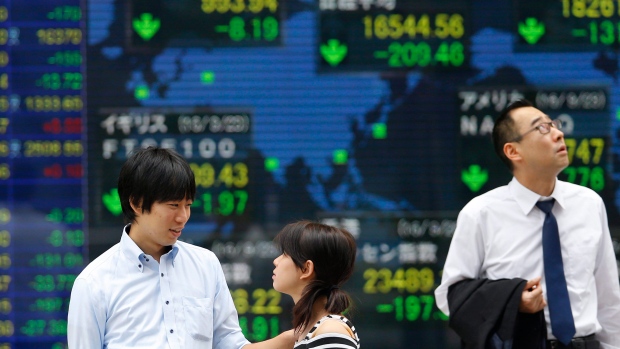Jan 30, 2017
Shares fall, U.S. dollar dips after Trump's immigration ban adds uncertainty
, Reuters

LONDON - Shares fell in Europe and Asia on Monday and the U.S. dollar dipped against the yen after immigration curbs introduced by Donald Trump added an extra layer of uncertainty to the economic impact of the new U.S. president's policies.
Wall Street appeared headed for a weaker opening, with e-mini futures contracts on the S&P 500 stocks index down 0.2 per cent.
Signs of accelerating inflation in Germany pushed yields on euro zone government bonds higher. French 10-year yields hit a 16-month high in early trade after an opinion poll showed conservative presidential election candidate Francois Fillon, the favorite to win the vote, losing ground.
Trump suspended travel to the United States from Syria, Iraq, Iran and four other countries on national security grounds. The executive order, signed on Friday, triggered huge protests in U.S. cities and raised concern among some in markets over the potential impact of other policy moves.
"Concerns on protectionism appear to be rising after President Trump's executive order to restrict immigration," said Adam Cole, head of G10 foreign exchange strategy with RBC in London.
The pan-European STOXX 600 index dropped 0.8 per cent, led by a 1.6 per cent fall in resources-related stocks as commodity prices fell.
Trade in Asian share markets was thinned by the Lunar New Year. MSCI's broadest index of Asia-Pacific shares outside Japan lost 0.5 percent. Australian shares closed down 0.9 per cent.
Japan's Nikkei fell 0.5 per cent as demand for the safe-haven yen weighed on exporters.
"Trump always stated these were policies he would implement," said James Woods, global investment analyst at Rivkin Securities in Sydney. "This renews concerns about a trade war with China that would significantly affect both the Asian and the global economy."
The dollar gained marginally against a basket of currencies. The index was at 100.58, having fallen as low as 100.17 in Asian trade.
The euro was flat at about $1.0690 and the yen was up 0.3 percent at 114.77 per dollar.
In debt markets, German 10-year yields turned higher and were up 2.6 basis points at 0.49 per cent after regional data lifted expectations of a pick-up in inflation in Germany as a whole.
Consumer prices rose 2.3 per cent year-in-year in Saxony this month. National data due at 1300 GMT is expected to show German inflation rose to hit the ECB's 2 per cent target.
The premium investors demand to hold French 10-year bonds rather than German hit its widest in three years after a poll on Sunday showed Fillon, embroiled in a scandal over allegations of misuse of public funds, losing ground to centrist candidate Emmanuel Macron.
Both candidates are ultimately expected to beat far-right candidate Marine Le Pen if either faced her in a run-off.
RAND FALLS
A big mover among emerging markets currencies was the South African rand, which fell 0.8 per cent to 13.59 per dollar after reports that President Jacob Zuma was considering a cabinet reshuffle in response to calls for his resignation in November. The rand earlier traded down 1.34 per cent.
Oil prices fell 0.7 per cent, weighed down by the reduced appe Utite for risk resulting from the immigration curbs and by signs of rising U.S. oil output. Data from Baker Hughes showed U.S. drillers added 15 oil rigs last week, taking the total to its highest since November 2015.
Brent crude, the international benchmark, fell 41 cents to $55.11 a barrel.
Copper fell 0.1 percent to $5,893 a tonne, with trade also thinned by the week-long new year holiday in China.





